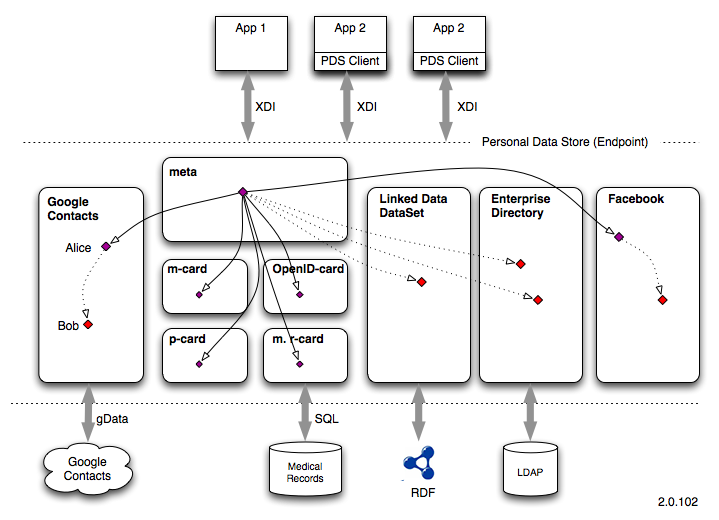Notice: this Wiki will be going read only early in 2024 and edits will no longer be possible. Please see: https://gitlab.eclipse.org/eclipsefdn/helpdesk/-/wikis/Wiki-shutdown-plan for the plan.
Difference between revisions of "PDS 2.0"
(→Access to user's personal data) |
|||
| Line 10: | Line 10: | ||
The [[IdAS Proxy Service]] is layered over the [[Attribute Service 1.1]] to provide a bi-directional, synchronizing XDI endpoint over data managed by Context Provider plug-ins to the IdAS package. These context providers area also data adapters to a variety of back end data stores. | The [[IdAS Proxy Service]] is layered over the [[Attribute Service 1.1]] to provide a bi-directional, synchronizing XDI endpoint over data managed by Context Provider plug-ins to the IdAS package. These context providers area also data adapters to a variety of back end data stores. | ||
| − | === | + | ===An endpoint for the user's personal data=== |
| − | The | + | The user's data are represented as a number of [[Context]]s adhering to the Higgins [[Persona Data Model 2.0]], which can be used for storing arbitrary (identity and social networking data) data. [[UDI]] references are used for representing "links" between [[Context]]s, both inside the [[Personal Data Store 2.0]] and to external data sources. |
The following diagram shows how apps can access the PDS endpoint over XDI. The diagram shows four contexts that backed by external data sources: Google Contacts, Medical Records, an RDF store and an enterprise LDAP directory: | The following diagram shows how apps can access the PDS endpoint over XDI. The diagram shows four contexts that backed by external data sources: Google Contacts, Medical Records, an RDF store and an enterprise LDAP directory: | ||
[[Image:Pds graphs.png|center]] | [[Image:Pds graphs.png|center]] | ||
Revision as of 15:26, 14 May 2010
{{#eclipseproject:technology.higgins|eclipse_custom_style.css}}
The Personal Data Store 2.0 is a web service that stores personal data on behalf of an individual.
The PDS is a variant of the IdAS Proxy Service, with the following changes:
- The UDI Resolver is configured to support sync:// UDIs.
- The IdAS Registry is configured to include the RDF2 Context Provider.
The IdAS Proxy Service is layered over the Attribute Service 1.1 to provide a bi-directional, synchronizing XDI endpoint over data managed by Context Provider plug-ins to the IdAS package. These context providers area also data adapters to a variety of back end data stores.
An endpoint for the user's personal data
The user's data are represented as a number of Contexts adhering to the Higgins Persona Data Model 2.0, which can be used for storing arbitrary (identity and social networking data) data. UDI references are used for representing "links" between Contexts, both inside the Personal Data Store 2.0 and to external data sources.
The following diagram shows how apps can access the PDS endpoint over XDI. The diagram shows four contexts that backed by external data sources: Google Contacts, Medical Records, an RDF store and an enterprise LDAP directory:

